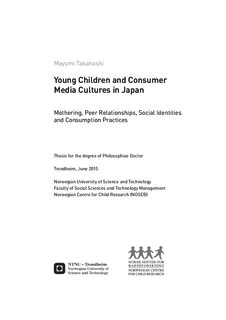Young Children and Consumer Media Cultures in Japan: Mothering, Peer Relationships, Social Identities and Consumption Practices
Doctoral thesis

Åpne
Permanent lenke
http://hdl.handle.net/11250/293288Utgivelsesdato
2015Metadata
Vis full innførselSamlinger
Sammendrag
This thesis, entitled Young Children and Consumer Media Cultures in Japan, explores
the role of consumption practices in the social interactions and everyday lives of young
children and mothers in a suburban context in Japan. With its focus on young children
(aged between 1 and 5) and mothers as primary care-givers, it analyses how they
experience consumer media culture while using, creating, controlling, transforming and
adapting commercial goods and knowledge, and the part this plays in their presentation
of self and their construction of interpersonal relationships in the home and the
preschool. My PhD research was affiliated with the research project at Norwegian
Centre for Child Research (NOSEB), “Consuming Children: Commercialisation and the
Changing Construction of Childhood”, financed by the Norwegian Research Council
from 2006-2009. The data were obtained through five months of fieldwork that
involved ethnographic methods such as participant observation, interviews and home
visits.
The thesis is based on the perspectives of childhood studies, consumer culture theory
and commercial enculturation. Following a discussion of theory and methods, it
includes three analysis chapters. Chapter 5 focuses on mothers’ ideological dilemmas
and their construction of identity through caring consumption. I explore how mothers
take responsibility for products, services and experiences on behalf of their young
children, while reflecting on children’s future becoming and present being. Chapter 6
focuses on young children’s sense of belonging in peer consumer culture. I explore the
significance of children’s having and knowing in preschool settings and discuss how the
meanings and values of certain possessions and forms of knowledge are consistently
interpreted and transformed among peers. Chapter 7 focuses on flexible social identities,
and in particular how children maintain different kinds of boundaries and transform
cultural resources in play. I explore the ways in which consumption practices serve as
tools for children’s construction of social identities.
Ultimately, I argue that consumption is not a simple matter either of control or of free
choice, and that researchers need to look beyond some of the dichotomies that have
tended to characterise discussion of these issues. With this thesis I am hoping to make
empirical, methodological, theoretical and disciplinary contributions to both childhood
studies and consumption studies.